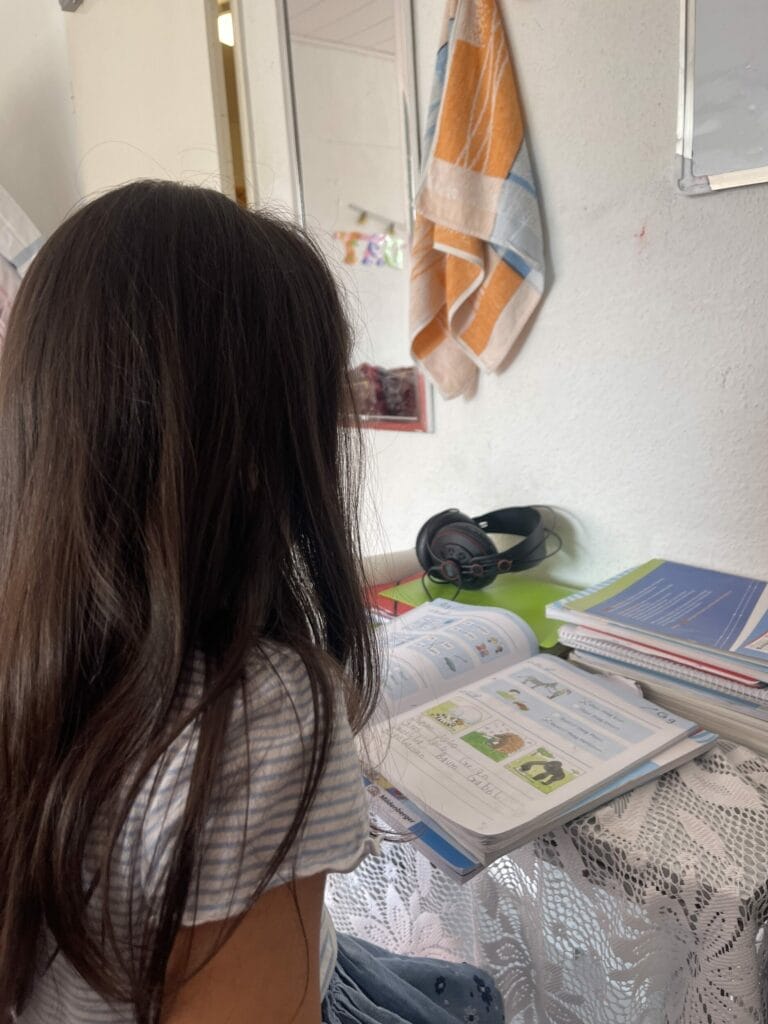A door opens: Kamela’s start into a new life in Germany
Kamela went through many hardships in Afghanistan. Now that she lives in Germany, she hopes some of her childhood dreams may come true – and for a better future for her kids.
As Kamela looks out of her room window, her eyes shine with hope and contentment. She expresses her comfort and gratitude for the peace she has found in this new place, far from the horrors of war and the fear of losing her loved ones: “I feel comfortable here, and I don’t have to worry about the safety of my husband and children. I am hopeful that a better future awaits my children, and their dreams will be fulfilled.” She adds: “It’s been two years since we arrived in Germany, and I am optimistic about the opportunities that lie ahead.”
With her five children and husband, she is living in a refugee centre in the region of Kassel and has a positive outlook on their future here in Germany.
Childhood and Dreams That Remained Dreams
Kamela, a 28-year-old woman, had only one dream as a child: to become a teacher. However, she never got the chance to even go to elementary school and learn fundamental lessons: There was a rivalry between her father and her father’s uncles. “My sisters’ and I were not allowed to leave our home; our dreams remained just that – a dream.” Looking back at her childhood and youth, Kamela seems to regret that she could not have access to basic human rights. “It’s a shame that fear can hold us back from pursuing our passion”, she says.
In a number of cities in Afghanistan, when clashes and disagreements happen between families on various issues, they lead to conflicts that result in forced displacement, loss of property and murder of one side. When there is a fight or murder between two families or tribes, one way to prevent the escalation of blood feuds is to give a girl to the other family, a habit called “Bad.” It is meant to restore the relationship between the two families. To the disadvantage of girls and women, the practice of “Bad” still exists throughout Afghanistan, even if it is in contradiction with human rights, values and norms.
* * *
To put an end to the rivalry between both families, Kamela’s great-uncle planned a “Bad”: He wanted her to marry one of his sons. However, Kamela’s father stood up against this custom and protected her daughter’s best interests by not allowing her to marry into a family with which they had an enmity. Instead, he decided that she should marry her marry her cousin. It is a common tradition in many Muslim countries. Her father’s resistance caused his murder by the rivals without changing her desperate fate, she continues: “I married my cousin against the wishes of my father’s relatives. When they found out about the wedding, they killed him. I will never forget that tragic incident in my life.”
Her eyes filled with sorrow and despair, she says:
This enmity not only took away my childhood and dreams but also my father.
After the marriage, Kamela and her husband, a street vendor selling goods, lived in the city of Pul Khomri. But it did not prevent their ongoing harassment of his family. “They didn’t leave us alone and in peace and started looking for us”, she recalls. Even he fell victim to the violence. One day, they found my husband and beat him severely. People intervened and saved him. Unfortunately, my husband lost his hearing in one ear due to that beating.”
In pursuit for a better future
After the unfortunate and tragic events, their living conditions became more and more difficult. They decided to migrate to save their lives and their children and not to witness the loss of another loved one: They made the agonizing choice to leave their homeland, taking the tough route through Iran to Turkey, and finally arrived in Greece.
Kamela sighs deeply and speaks about life in Greece, where they spent around one and a half years and experienced many hardships: “In a refugee camp on Moria Island We shared a tent with one another family; there was not enough food and water for us.” Even access to basic supplies meant a struggle for them. “Every day at four in the morning, we had to stand in the food line so that we could get bread for the five of us”, she tells. Additionally, there was a lack of electricity and cold weather.
Their unwavering determination and hopeful vision for a brighter tomorrow made even the toughest days bearable, propelling them toward their destination in Germany.
Life in Germany
After enduring a wait of one and a half years, their patience and determination finally paid off as they were granted the opportunity to enter Germany. They flew to Germany to embark on a new life in a new country. She says: “It was a moment of immense relief; the anticipation of our upcoming journey in Germany felt like a burden had been lifted from my shoulders.” She adds: “Here in Germany, we have problems, too, but different compared to what we faced back in Afghanistan. We feel relieved that there is no war or conflict.” She has been living in a refugee centre for almost two years. The family has yet to receive the paperwork; their immigration case is still under process. The two daughters attend school, but the five-year-old son has not yet visited kindergarten. She adds:
These days, my only concern is to find an apartment to get out of the refugee centre. Living here with five children is a challenge itself.
As she looks at her eldest daughter occupied in doing her homework and her studies, she, with a heavy heart, says: “I am not sure when I will myself have the chance to study and find my way. I don’t know how to read and write; the opportunity to receive elementary education back in Afghanistan was never available and accessible to me. I don’t know anything; after arrival until today, I haven’t been able to attend language school because I am busy raising my children, and my two children are very young.”
Kamela’s husband is also illiterate; both suffer from their situation, and they wish to learn the language one day and get out of this dark state. She continues: “It is difficult for my husband to learn the language.” As the family does not have access to an interpreter, they also lack other necessary services. “If any of our friends or acquaintances are free, they will help us with our appointments and paperwork due to the language barrier; otherwise, we will miss deadlines or delay our appointments”, she explains.
Future and Dreams
Kamela’s eyes fill with optimism as she shares her thoughts on the next chapter: “I was deprived of seeking education now my biggest wish is to be able to learn the language, to get to know the surroundings better; after obtaining sufficient information about the country and its job market, I will decide what career to choose and will craft a destiny that radiates promise and prosperity for myself and my family.” And when she speaks of her children, her eyes light up with unwavering hope: “I don’t want my children to be illiterate like us; they deserve a bright future. I shall stand by their side as a pillar of support, nurturing their dreams to reach the stars in any field they choose.“

Post published on December 10, 2023
Last edited on December 10, 2023
[mc4wp_form id=239488]


Leave a Reply
You must be logged in to post a comment.